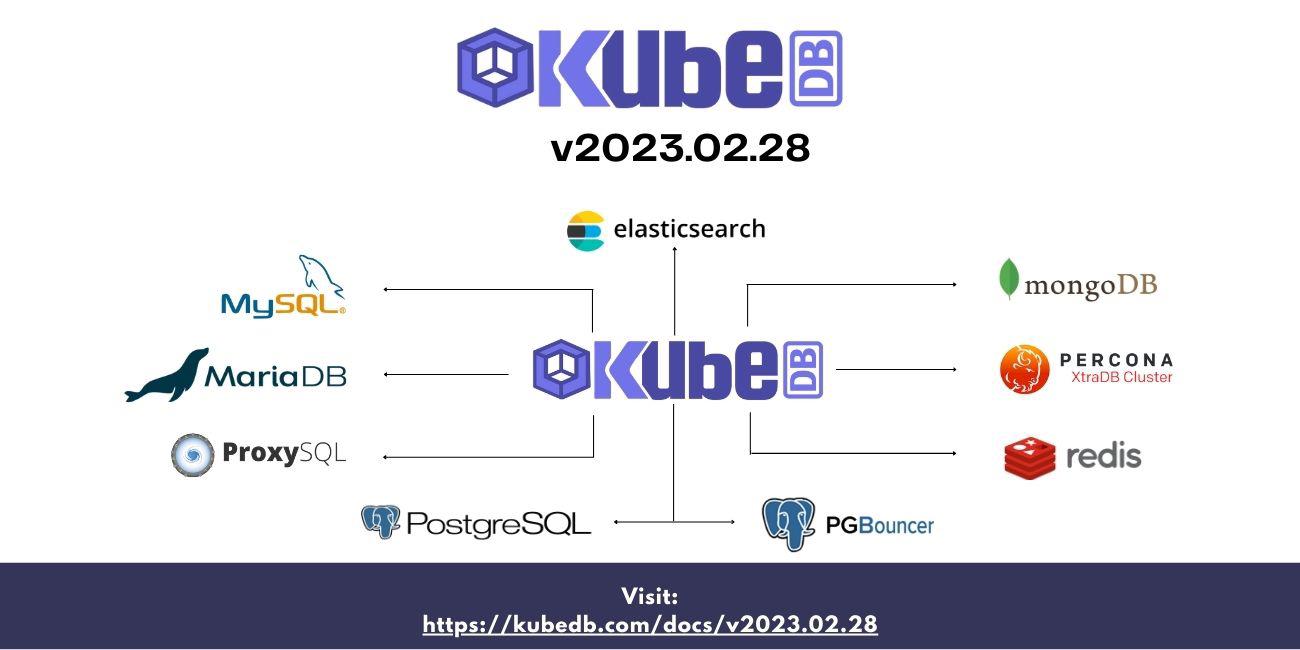
We are pleased to announce the release of KubeDB v2023.02.28
. This post lists all the major changes done in this release since the last release.
The release include new features Combined PEM Certifiacte Postgres StandAlone to High Availibility, Acme Protocol based certificate support for ProxySQL & PgBouncer and new verisons for MySQL:8.0.32 , 5.7.41 ,
OpenSearch 2.0.1 , 2.5.0 , Redis: 6.0.18,6.2.11,7.0.9.
You can find the detailed changelogs here .
Combined PEM Certificate
From this release, client certificates secret for TLS enabled databases now contain combined PEM certificates.
The combined PEM certificate is stored under the key tls-combined.pem in the client certificate secret.
To enable this, the cert-manager needs to be deployed with feature-gate AdditionalCertificateOutputFormats=true.
To install cert-manager with this flag using helm you can use the following command.
helm install \
cert-manager jetstack/cert-manager \
--namespace cert-manager \
--create-namespace \
--set installCRDs=true \
--set featureGates=AdditionalCertificateOutputFormats=true
Acme Protocol Certificate
ProxySQL & PgBouncer
In this release we introduced TLS support using ACME Protocol based Certificates with Let’s Encrypt. Now you can provision KubeDB PgBouncer with TLS secured connection via both CA and ACME issuer using cert-manager. Here’s an example using acme issuer with ProxySQL
apiVersion: cert-manager.io/v1
kind: Issuer
metadata:
name: le-issuer
namespace: demo
spec:
acme:
# server: https://acme-v02.api.letsencrypt.org/directory
server: https://acme-staging-v02.api.letsencrypt.org/directory
email: <your_email>
# Name of a secret used to store the ACME account private key
privateKeySecretRef:
name: <secret_ref_name>
# ACME DNS-01 provider configurations
solvers:
# An empty 'selector' means that this solver matches all domains
- selector: {}
dns01:
cloudflare:
email: <your_email>
apiTokenSecretRef:
name: <secret_ref_name>
key: api-token
---
apiVersion: v1
kind: Secret
metadata:
name: <secret_name>
namespace: demo
type: Opaque
stringData:
api-token: "sometoken"
apiVersion: kubedb.com/v1alpha2
kind: ProxySQL
metadata:
name: proxy-server
namespace: demo
spec:
version: "2.4.4-debian"
replicas: 1
mode: GroupReplication
backend:
name: mysql-server
syncUsers: true
tls:
issuerRef:
apiGroup: cert-manager.io
kind: Issuer
name: le-issuer
certificates:
- alias: server
dnsNames:
- <challenge_resolver_dns>
terminationPolicy: Delete
healthChecker:
failureThreshold: 3
PostgreSQL
Now you will be able to migrate from StandAlone to High Availability Cluster for PostgreSQL. The migration process will copy the data for new replicas first and thus preventing possible data loss during the migration process.
apiVersion: ops.kubedb.com/v1alpha1
kind: PostgresOpsRequest
metadata:
name: move-to-high-availibility
namespace: demo
spec:
type: HorizontalScaling
horizontalScaling:
replicas: 3
streamingMode: Synchronous
standbyMode: Hot
databaseRef:
name: demo-pg
Elasticsearch
Latest versions for OpenSearch 2.0.1 and 2.5.0 added in this release. Now, you can provision and manage OpenSearch V2 with Elasticsearch CRD using KubeDB.
Check out all the currently supported Opensearch Versions using the following command.
$ kubectl get esversion | grep opensearch
opensearch-1.1.0 1.1.0 OpenSearch opensearchproject/opensearch:1.1.0 29h
opensearch-1.2.2 1.2.2 OpenSearch opensearchproject/opensearch:1.2.2 29h
opensearch-1.3.2 1.3.2 OpenSearch opensearchproject/opensearch:1.3.2 29h
opensearch-2.0.1 2.0.1 OpenSearch opensearchproject/opensearch:2.0.1 29h
opensearch-2.5.0 2.5.0 OpenSearch opensearchproject/opensearch:2.5.0 29h
If you are using any of the Opensearch 1.x.x versions, you can very easily upgrade to OpenSearch 2.x.x with data persistence using the following ElasticsearchOpsRequest CRD.
apiVersion: ops.kubedb.com/v1alpha1
kind: ElasticsearchOpsRequest
metadata:
name: os-upgrade
namespace: demo
spec:
type: Upgrade
databaseRef:
name: os-cluster # refer the name of you opensearch instance
upgrade:
targetVersion: opensearch-2.0.1 # refer the target version to be upgraded
We recommend upgrading to OpenSearch 2.0.1 before upgrading to any other V2 minor versions.
Elasticsearch Dashboard
Along with support for Opensearch V2, KubeDB also brings support for Opensearch Dashboards version 2.0.1 & 2.5.0 in this release. Visualize Opensearch data easily and conveniently by provisioning Opensearch-Dashboards in your cluster using KubeDB. Use the following YAML to deploy TLS secured Opensearch-Dashboards with ElasticsearchDashboard CRD.
apiVersion: dashboard.kubedb.com/v1alpha1
kind: ElasticsearchDashboard
metadata:
name: os-cluster-dashboard
namespace: demo
spec:
enableSSL: true
databaseRef:
name: os-cluster # refer the name of you opensearch instance
terminationPolicy: WipeOut
On upgrading the Opensearch version using ElasticsearchVersion CRD, KubeDB ops-manager autonomously upgrades Opensearch-Dashboards to their compatible versions.
MySQL
Latest version for MySQL 8.0.31 and 5.7.41 also added in this release. Here’s a example instance that usage MySQL Group Replication
apiVersion: kubedb.com/v1alpha2
kind: MySQL
metadata:
name: mysql-group
namespace: demo
spec:
version: "8.0.32"
replicas: 3
topology:
mode: GroupReplication
storageType: Durable
storage:
storageClassName: "standard"
accessModes:
- ReadWriteOnce
resources:
requests:
storage: 10Gi
terminationPolicy: Delete
Redis
Latest versions for Redis 6.0.18, 6.2.11 and 7.0.9 also added in this release. Example of a Redis Standalone instance with version Redis 6.0.18
apiVersion: kubedb.com/v1alpha2
kind: Redis
metadata:
name: sample-redis
namespace: demo
spec:
version: 6.0.18
storageType: Durable
storage:
storageClassName: "standard"
accessModes:
- ReadWriteOnce
resources:
requests:
storage: 1Gi
terminationPolicy: WipeOut
What Next?
Please try the latest release and give us your valuable feedback.
If you want to install KubeDB, please follow the installation instruction from here .
If you want to upgrade KubeDB from a previous version, please follow the upgrade instruction from here .
Support
To speak with us, please leave a message on our website .
To receive product announcements, follow us on Twitter .
If you have found a bug with KubeDB or want to request for new features, please file an issue .










